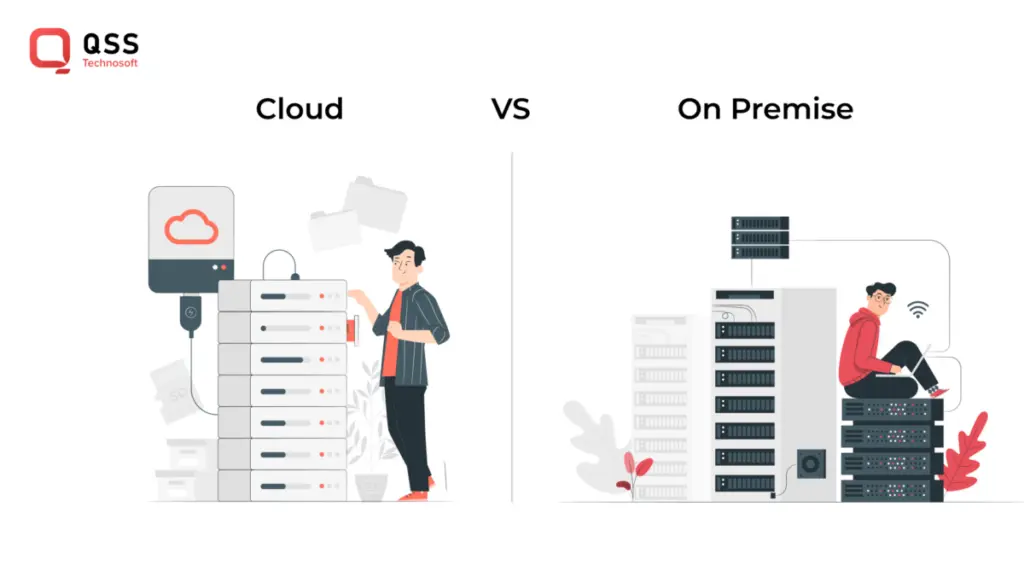In today’s competitive scenario, with various IT infrastructures in the market, deciding which is a go-to option for any organization becomes a hectic task. The two major IT infrastructures include Cloud-based and On-Premise solutions.

Cloud-based solutions are hosted on remote servers and offer a wide range of flexibility, scalability, and robust security to their users. It is easily accessible through the internet and is capable of helping enterprises grow operational efficiency without making any huge investments in hardware models.
On the other hand, On-Premise cloud runs on local servers and computers which has the capability of providing robust security, and customized user experience. Through this, organizations have the power to completely take control over their IT infrastructure, ensuring proper regulations and data privacy and meeting regulatory compliances.
Are you also ruminating about whether to use On-Premise or Cloud for your organization?
Let’s dive deeper into this blog and understand the intricacies that organizations go through while choosing the right infrastructure, their benefits, risks, and factors that influence these decisions.
Read also:- How to boost Your Cloud mastery and AWS with Amazon Q
Factors influencing the decision
Various factors influence the decision-making of choosing what suits best for every organization. Before we delve deeper into the topic, let’s discuss four factors that will influence your decision.
Business Size
Business size plays a crucial role in deciding what to choose between On-Premise and Cloud-based services. In the case of SMEs, using cloud solutions helps in scaling up without making large initial investments in hardware or software. This means that SMEs can grow without challenges. On the other hand, larger corporations may find on-premise cloud attractive because they have already established infrastructure. However, such a move requires heavy initial investments and continuous maintenance expenses thus it becomes less flexible in scaling up or down.
Industry
Different industries have different needs. The finance sector, for example, or healthcare often handles sensitive information and might initially prefer on-premises cloud for security concerns. However, most cloud providers now offer robust security measures that are higher than those available with onsite setups. In addition to this, there are better opportunities for collaboration and data sharing through the cloud which plays a crucial role in modern industries.
Data Security
Data security is an important aspect of any organization while shifting the data sets. Some Organizations believe on-premise solutions as a priority when compared based on data control. However, with the current advancements in technologies, cloud service providers also provide robust security features. Thus, there are minimal risks of data breaches even with cloud solutions.
Regulatory Compliances
Cloud providers need to maintain regulatory compliances such as GDPR in Europe, and HIPAA in the United States. Several trusted cloud service providers follow these standards, assuring their customers of robust security and proper records. On the other hand, in the case of on-premise solutions, organizations are themselves responsible for maintaining all the regulatory standards.
Cloud vs On-Premise
Risks of Cloud-Based Solutions

Security Concerns
Various data breach concerns are usually seen in the case of organizations using cloud solutions. Such things are quite usual in such infrastructure due to the data being stored and operated by third-party providers. There are various security regulations followed by these service providers. However, the data being stored at third-party platforms puts the data under cyber threat and security breach. Thus, it becomes crucial for enterprises to choose the right service provider who can meet all the organizational requirements and security regulations at the same time.
Several cloud computing companies provide robust cloud solutions, for instance- AWS, Azure, and Google Cloud, making the internet a safe place to store data.
Downtime and Reliability Issues
Generally, in a cloud environment, the service level agreement (SLA) between provider and customer controls uptime. However, even with high levels of promised uptime, cloud services are not entirely immune to outages. For instance, if a major cloud service goes down all businesses that rely on that service for their important operations will be affected. In the present-day world of disruptive innovation and increasing hyper-competition, this is one thing that should not be taken lightly when considering the cloud Vs on-premise costs.
Risks of On-Premise
Insecurity Loopholes
One significant downside to having an on-premise system is its exposure to security threats. These systems are typically maintained in-house, which means that only the company itself bears responsibility for any security measures.
While this can be good from a control perspective it also exposes you more if your IT team is weak. This risk becomes especially stark when compared to cloud solutions where providers usually have specialized security staff and rigorous protocols indicating how cloud Vs on-premise works better in terms of security concerns.
Limited Scalability
On-premise solutions hold the limitation of scalability, which businesses have to face while scaling up their operational goal, workflows, and organizational data.
The scalability of on-premise infrastructure requires huge costs for hardware, installation, and maintenance, which is a costly and time-consuming process. Whereas, if an organization adopts cloud solutions, it becomes easy to scale without such huge costs and time consumption.
Read also:- Transforming Business using AWS-AI ML services
Why Choose QSS Technosoft?
QSS Technosoft is one of the leading cloud computing companies delivering exceptional cloud-based solutions. Our solutions are designed to bring improved performance, faster development, and enhanced organizational efficiency. We provide custom cloud solutions for every business organization.
Our dedicated team is adept at hosting applications on AWS, Google, and Azure, that are scalable, robust, and can be integrated easily with every kind of infrastructure.
Conclusion
If you are looking to set up your IT infrastructure, and pondering over this critical question, it becomes crucial to weigh all the factors, benefits and risks in advance. Both the infrastructure holds benefits and risks at the same time and making a smart decision is indeed crucial. Your analysis must align with the business model, size, IT infrastructure and cost efficiency. The choice should be made keeping in mind the long-term organizational goals.
You can book a consultation at QSS Technosoft and get in touch with our expert for guidance. Our dedicated team is ready to provide you with exceptional cloud solutions that match your business goals.
FAQs
1. What are the benefits of Cloud services?
There are numerous benefits of opting for cloud services for your organizational goals. These include scalability, less capital investments, technical expertise, and costs.
2. What is the difference between cloud and on-premise computing?
Cloud computing solutions are hosted and accessed over the internet and managed by third-party providers. On the other hand, on-premise computing involves the infrastructure within the organization, that is run over local servers.
3. Why should I choose on-premise solutions over cloud computing?
When you want full control over your organizational data and infrastructure, you should opt for an on-premise solution. With such adoption, you are solely responsible for maintaining regulatory norms, protecting your organizational data, and fulfilling other requirements.
4. How should I decide between cloud solutions and on-premise cloud for my enterprise?
While making this crucial decision, you should know the organization’s budget, IT vulnerability, scalability needs, regulatory laws, and other things. Thus, conducting thorough research and analysis is crucial.
5. Are there any drawbacks to using cloud-based solutions?
One of the major problems faced with this solution is internet connectivity, in places with no internet connectivity, cloud solutions cannot be implemented. Furthermore, there are some concerns regarding data privacy and accumulated costs.

On-Premise vs. Cloud: A Comprehensive Analysis of Benefits and Risks